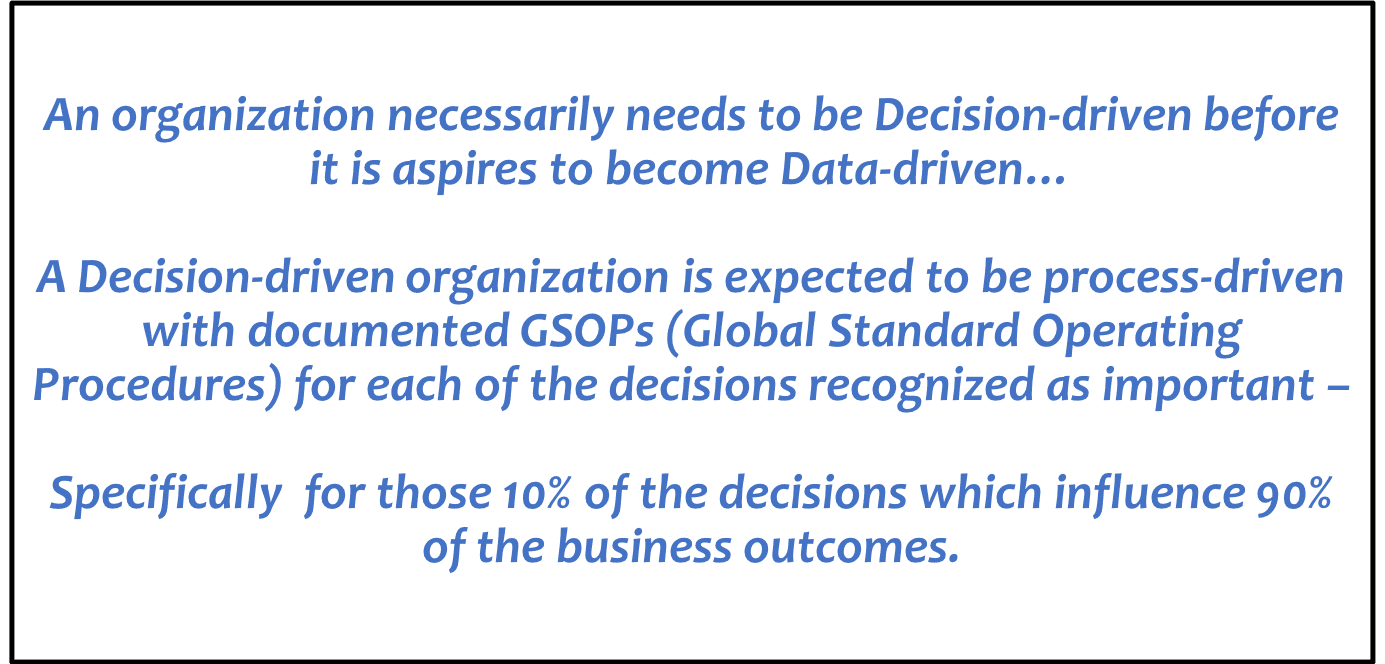THE THREE GOOD DECISIONS..
Some thirty years back, when I started my career as a management-trainee with an Aerospace company; the 18 months long training program included several courses in management.
I still remember the very first class-room session as if it was yesterday. A distinguished-looking retired professor from IIM Calcutta was introduced by the principal of the Staff-college, and as he addressed the class he declared “I am a Jew! …hope none of you have a problem?” (This used to be the time when the Indian Government very strongly identified with the Palestinian cause).
On assuring himself that we have no problems whatsoever, he proceeded to ask the next question. “Who is a good manager?” … There were a few of us bold enough to try a response. The professor faithfully wrote down everything we said on the board… A wide variety of juvenile definitions ranging from “someone who always gets work done” to “someone who gets work done more efficiently.” … all to be expected from a set of green-behind-the-ears freshers.
“How many of you have heard of Peter Drucker?” …
Fortunately, a good many of us did. (I came to know much later that Peter Drucker was also of Jewish descent. His ancestors were Jewish, but his parents had converted to Lutheranism)
“Well, glad you do… Peter Drucker defines a good manager as someone who takes three good decisions out of ten”.
Not surprisingly, we were all completely lost… It made no sense… Just 30%? …One fails to clear one’s exam at 30%…
The Professor then went on to relate how he asked the very same question when he met Peter Drucker in a seminar. Apparently, Peter Drucker told him – “A manager must take decisions, even if only three out of ten turn-out to be good decisions”.
As they say, that is one premise that I have kept unchallenged ever since. A manager must take decisions. Must take decisions in-time, and as many good decisions as he could.
Overtime, I joined a business school to do my MBA, but I guess Peter Drucker was passé by then, I don’t remember any professor specifically talking about the importance of taking right decisions in right time. I have been through eight different companies in multiple roles ever-since, set-up and scaled businesses, consulted for several companies across industry sectors for over two decades, set-up multiple ODCs and shared-services for customers….
But I doubt if I ever paused to think if I was taking right decisions in right time? Ever?
DECISION-DRIVEN BEFORE DATA-DRIVEN
However, all that changed when I was trying to create a business-case for setting up an Analytics Lab in my last assignment – a kind of internal Centre-of-Excellence for Analytics. After a gruelling tale of trying to take advise and help from different consulting firms and searching through all the published sources, we discovered there was little to nothing as a process for creating an organization-wide roadmap for analytics. Given the near-complete absence of any published sources (three notable exceptions including one from Bain consulting will be explained in the next article), we were forced to come-out with a process of our own.
The most disturbing discovery was – that an organization necessarily needs to be Decision-driven before it is Data-driven.
We have noticed the decision-making process across organizations (not just ours) was informal, and more often-than-not without an audit-trail. No Manager seems to list the decisions that he takes – let alone record the reasons. The only notable exceptions are related to the capital-expenditure, where most organizations have a set process and an audit-trail mandated for decisions beyond a certain threshold value.
However, there are hundreds of operational decisions that are repetitive in nature, usually made by an every-day manager – that cumulatively account for a much-higher value than all capital-expenditure related decisions taken in the company. For example: the quantum of buffer-stock by each SKU may be individually a very small decision, but by annual-cumulative value across SKU’s, it may be the-most-important decision that significantly influences the profitability and performance of the company.
A Decision-driven organization is expected to be process-driven with documented GSOPs (Global Standard Operating Procedures) for each of the decisions recognized as important – Specifically for those 10% of the decisions which influence 90% of the business outcomes.
In our experience, we are yet to come across any organization which meticulously identifies critical decisions, and creates GSOPs for each one of them.
Even more surprisingly, a good many of them have a budget for big-data and Analytics, and all of them aspire to be data-driven….
———————————————————————————————————————————————-
